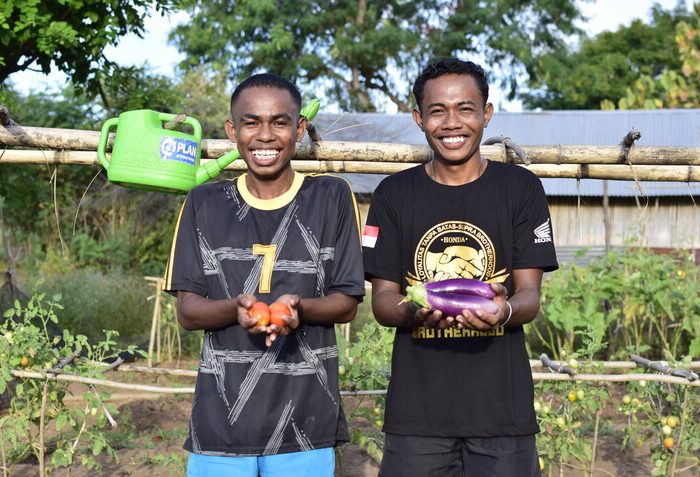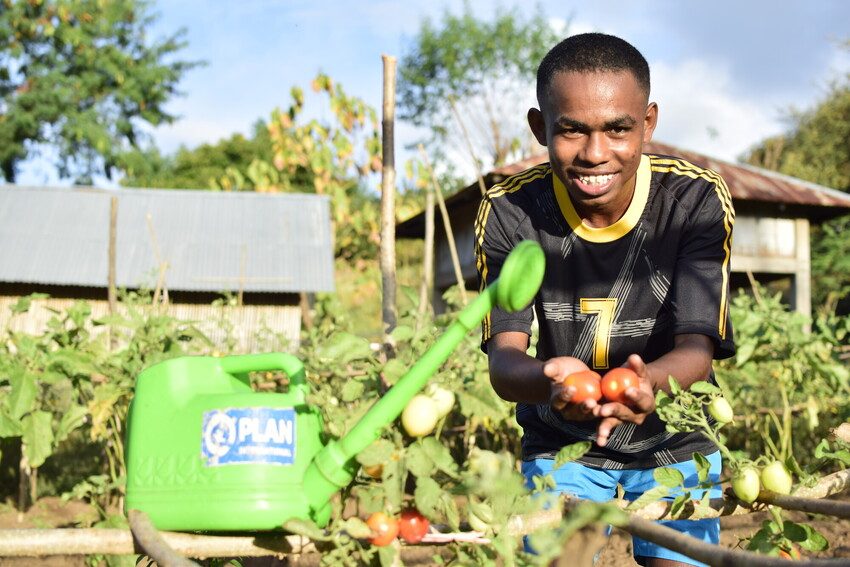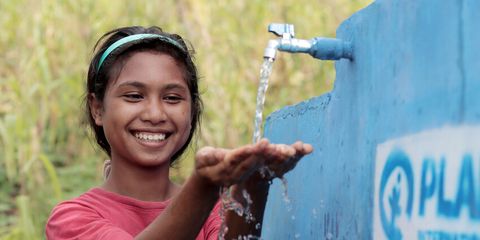Big dreams in the backyard
In a remote village on Lembata Island in Indonesia, Paul and Taran have turned a backyard plot into a thriving vegetable business – earning them an income, inspiring their community, and proving that big dreams can grow in small spaces.

Paul and Taran, 20, with some of the crops they grow. © Plan International
A few months ago, Paul and Taran’s lives were much like those of other teenagers in the village: waking up early, helping their parents with the chores, sweeping the yard, looking after younger siblings, and playing their favourite sport, football.
Long-term paid employment was not really an option. This is because their formal education ended after high school and there were no stable job opportunities in the local area. “I remember feeling lost back then,” says Paul, pausing between rows of plants. “Every day just slipped by without any direction.”
Taran nods, smiling faintly at the memory. “We even thought about moving away, maybe finding work in the city,” he says. “But we had just finished high school, so instead we spent our days training and keeping fit.”
Seeds of change
Joining a climate-smart agriculture training programme proved to be a turning point. Paul and Taran, both 20 years old, signed up with little expectation. Over 3 days, they learned practical skills, such as how to choose good quality seeds, make organic fertiliser and manage their harvests efficiently. At the end of the training session, each participant was encouraged to create an action plan. Paul and Taran’s plan was simple: to start a small vegetable garden on a ten-square-metre plot of land behind their home.
“We thought it would just be a short training course,” explains Taran, lifting a watering can to sprinkle the thriving aubergines. “But it turned out to be more than that. We received ongoing mentoring, as well as basic farming tools such as nets, watering cans and seeds for tomatoes and aubergines. We started planting right after the training ended.”
Growing more than vegetables
Five months have passed since they first started their vegetable garden. They now have 4 beds with 131 tomato plants and 3 beds with 118 aubergines. They sell the fresh vegetables to villagers in the surrounding area. Since their first harvest, they have earned around 2.5 million rupiah (about USD 150) in total. This may seem like a modest amount to some, but it is an incredible achievement for 2 young people who never imagined they could earn an income from a patch of land behind their home.

It’s not just their income that has grown – it’s their confidence, too. Paul and Taran have not only become young farmers, but they are also an inspiration to their peers.
The village government soon took notice of their progress. “We saw their dedication. They weren’t just doing it for the sake of it. This is a real example of commitment and hard work,” says Muslimin, the village head. In recognition of their efforts, the local government provided a stimulus grant of three million rupiah to help them expand their garden, add new crop varieties and purchase additional farming tools.
But the support did not stop there. The village administration also shared a long-term plan. If Paul and Taran’s garden continues to grow and produce a steady supply of vegetables, it could be designated as an official local vendor for a free nutritious school feeding programme being developed at the subdistrict level. This means that Paul and Taran could soon become part of the local food supply chain, contributing directly to community well-being and strengthening local food security.
“I never thought that growing tomatoes and aubergines could get us this far,” says Paul, his eyes bright with pride. “I used to just help my parents plant corn. Now, I can manage my own garden. At first, we went from house to house selling vegetables, but now people come straight to the garden to buy from us.”
Building a new future
These days, their mornings no longer begin without purpose. They wake up with a plan, follow their planting calendar, set production targets and are preparing to expand their plot. More than that, they are establishing a system by practising organic farming, rotating crops and keeping simple financial records to track their progress.
They are currently learning how to make natural compost and have started to build a small seedling house using bamboo and recycled plastic. “We want our vegetables to be healthy and free from chemicals,” explains Taran. “That’s also what makes them more valuable when we sell them at the market.”
While Paul and Taran’s story may not make national headlines, at a time when the world is talking about urban migration, youth unemployment and food insecurity, these 2 young people from a quiet village on Lembata Island are offering a different vision: you can build a future right where you are.
Categories: Skills and work

